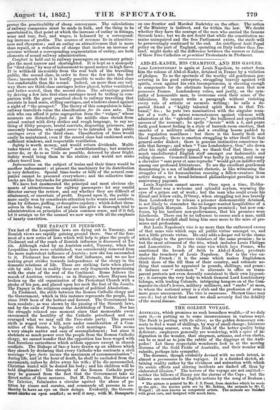ABD-EL-KADER, HIS CHAMPION, JP, I) HIS GAOLER. LORD LONDONDERRY is
again at Louis Napoleon, to extort from him the release of Abd-el-Kader, detained in France by a violation of pledges. To us the spectacle of the worthy old gentleman per- severing in his good enterprise, struggling bravely against evil spirits, even against his own incompetencies, is cheering enough to compensate for the obstinate baseness of the man that now possesses France. Londonderry relies, and justly, on the sym- pathy of honourable men, to overcome even their sense of the ridiculous. He cannot write a paragraph without violating every rule of artistic or accurate writing : he calls a de- parted friend a " highly talented spirit flown to that Tri- bunal," 8.:c. ; he puts two nominatives with the singular num- ber of a verb ; he mixes remonstrances against vileness with admiration at the " splendid career," the bnllioned and epauletted success of the recreant; he spells " heroio " with a k, and pours forth good honest feeling in a style of barrack-room emotion, that smacks of a military collar and a swelling bosom padded to the regulation manliness : but there is the hearty flesh and blood beneath ; there is emotion struggling to utter itself in that general-order dialect ; there is genuine instinctive conscience in- side that farrago; and when " Vane Londonderry, Gen." sits down after his right soldierly appeal, we thank God that there is so much unadulterated English stuff amongst our fashionable and ruling classes. Cromwell himself was faulty in syntax, and many a chevalier " sans pear et sans reproche " would get on indifferently among our professed litterateurs. To see the excellent gentleman floundering in a sea of indifferent rhetoric, is like witnessing the struggles of a fat humanitarian rescuing a fellow-creature from active danger, or a broad-brimmed philanthropist parading in an anniversai y pageant.
Louis Napoleon cannot answer. Once upon a time, Holder- nesse House was a welcome and splendid asylum, warming the eyes of a prince out of work ; but the man who could evade his friend and fellow exile, D'Orsay, when struggling not less bravely than Londonderry to release a prisoner dishonourably detained, is not likely to remember the no-longer-wanted hospitalities of a mere English Marquis. Louis Napoleon promised; but now con- fesses, by his taciturn non-performance, that his promises were falsehoods. There can be no influence to coerce such a man, until his hour of downfall shall bring him once more to the mire of pro- mises and professions. But Louis Napoleon's vice is no more than the enthroned excess of that same vice which saps all public virtue amongst us, and not a little private virtue. H' e only adds a deeper red to the lame which clings to the previous violators of the same promise ; he is but the most advanced of the trio, which includes Louis Philippe and Lamoricidre. It is the same vice which lays France, who sanctioned the breach of faith to Abd-el-Kader, prostrate under the treachery of Louis Napoleon. Nor is the vice ex- elusively French : it is the same which makes Englishmen think more of the till than of their country, and estimate no- thing that cannot be appraised in pounds, shillings, and pence: it induces our " statesmen " to alternate in office on trans- parent pretexts not even decently consistent to their own hypocri- sy; it corrupts the very body to which General Lord Londonderry belongs, with trading Colonels, intriguing hangers-on at the Com- mander-in-chiefs levees, military milliners, and " snobs " at mess, to whom the national army is a club and the profession of arms a mere peace amusement. The vice is meanness. Sterner times may cure it ; but at their first onset we shall severely feel the debility of the moral disease.


























 Previous page
Previous page